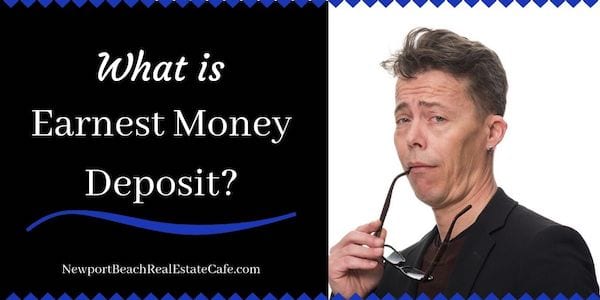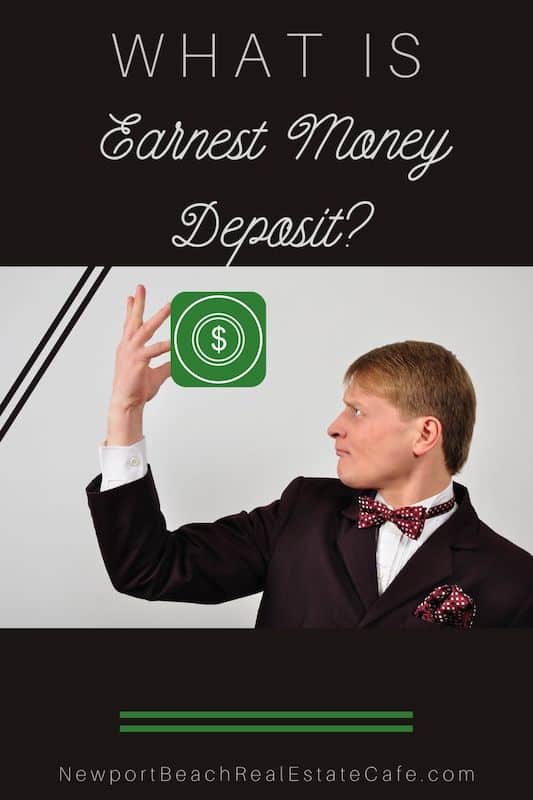There is a difference between earnest money versus a down payment. Purchasing a home can quickly become a confusing time if you aren’t used to the process. With agents and lenders using terms common to their industry, it can sometimes feel like they are speaking a foreign language. Add to this, the fact that you are making probably the biggest financial commitment of your life, you need to make sure you understand exactly what is happening. Having an understanding of the home buying process along with the terms that real estate agents utilize will help you to be prepared.
Early on in the process, you are going to come across the phrases “earnest money deposit” and “down payment”. These are important terms to understand the difference in since they involve large sums of your money being paid. Let’s take a look at what these terms mean and how they will affect the purchase of your home.
Earnest Money Deposit: What is it?
When a seller accepts your offer they want to know you are genuine. This allows the seller to take the home off the market and proceed with the sale to you. The earnest money shows that you are committed to the purchase and means that you need to pay a deposit which will compensate the seller should you pull out of the deal. It gives the seller a guarantee and means that buyers can’t just speculatively make offers on multiple homes.
How Much Earnest Money Will You Need to Pay?
There is no set amount for the percentage required for an earnest money deposit. It is typically  3% of the purchase price of the home. If you are offering $500,000 on a home, the earnest money deposit would be $15,000. If you offer $5,000 or 1% as earnest money, then the seller may think you don’t have any skin in the game. Earnest money deposit shows good faith to the seller that you are serious about purchasing the home, and want to proceed with the real estate transaction. A seller will not be likely to want to tie up their property with a buyer who is not serious about the transaction.
3% of the purchase price of the home. If you are offering $500,000 on a home, the earnest money deposit would be $15,000. If you offer $5,000 or 1% as earnest money, then the seller may think you don’t have any skin in the game. Earnest money deposit shows good faith to the seller that you are serious about purchasing the home, and want to proceed with the real estate transaction. A seller will not be likely to want to tie up their property with a buyer who is not serious about the transaction.
How you are financing the purchase can factor into the earnest money the seller requires. If you are purchasing with cash they might want a larger deposit. This can lead to deposits of 3 percent or more needing to be paid by the buyer.
The seller is at liberty to negotiate the deposit amount or reject what the buyer offers if they are not satisfied with the amount of the earnest money deposit.
What Happens When You Pay a Deposit?
When the purchase agreement is signed, you will need to have your earnest money ready. This can frequently be paid as a personal check and will be held by the escrow. The escrow company is a neutral holding party between the buyer and the seller. The money sent via personal check, cashier’s check or wire. This is all specified in the purchase agreement and your Realtor should be discussing this with you along with all of the other terms of the purchase.
The check should be paid into an escrow account and credited to the down payment or closing fees when the sale successfully closes.
If a buyer feels that they want to back out of the deal, this deposit may go to the seller if all the contingencies have been removed. It will depend on the terms in the contract, however. There should be some clauses in the contract which allow for the seller to back out of the deal if problems with the property are found.
As a buyer, you need to understand what situations allow you to get out of the contract and retain your deposit. These clauses will allow a buyer to legally get back their earnest deposit should things not go to plan.
Down Payment: What is it?
 The down payment is money which the buyer pays to the seller directly. While the rest of the money may come from a lender, the down payment isn’t paid to the lender. The down payment will be delivered to the escrow company prior to the property closing escrow.
The down payment is money which the buyer pays to the seller directly. While the rest of the money may come from a lender, the down payment isn’t paid to the lender. The down payment will be delivered to the escrow company prior to the property closing escrow.
This down payment can come from savings, proceeds of a previous sale or any other sources. The down payment is paid at closing and normally through a cashier’s check or bank transfer.
How Much is the Down Payment?
The amount of the down payment is decided by the mortgage lender. Traditionally, this was set at 20 percent of the purchase price, but less is normally acceptable to lenders nowadays. Real estate agents may still recommend the 20 percent figure and for good reason though.
Offering the 20 percent figure as a down payment will make the seller more likely to accept the offer. The further away from this amount you are, the more it could negatively affect your chances of having your offer accepted.
When you are deciding on the down payment amount, you have to remember that this isn’t the only expense you will need to cover. At closing, there will be other costs which you will need to pay. You need to make sure you don’t overstretch your finances and then find yourself unable to meet these closing costs.
What is Earnest Money Deposit versus a Down Payment?Click To TweetCan You Pay Less Than 20 Percent?
Finding 20 percent of the offer price is going to be a big deal for many homebuyers, particularly first time buyers. This is  entirely understandable and, fortunately, there are more lending options for purchasers now. This means down payments of as little as 3 percent are possible. If buyers aren’t able to finance the 20 percent amount, this can be a great way to still be able to get into the housing market.
entirely understandable and, fortunately, there are more lending options for purchasers now. This means down payments of as little as 3 percent are possible. If buyers aren’t able to finance the 20 percent amount, this can be a great way to still be able to get into the housing market.
With the lower down payments, there is a downside, however. The lender will likely want you to pay mortgage insurance on top of your normal mortgage payments. This cost can be significant, often amounting to around 1 percent of the loan figure.
This could leave buyers having to find an extra $2,500 per year to cover the cost of the mortgage insurance on a $250,000 loan. If you are able to find the money to cover the 1 percent down payment, you can avoid this ongoing charge and save money in the long run.
When you can get all your finances in order, securing the earnest money and down payments, buying your dream home will be close to becoming a reality. There are more options than you may have expected to help you finance a purchase and secure you your own home.
If you fail to get approved for a mortgage, this would be a contingency of purchase, and the buyer would request their deposit back. It is beneficial to get pre-approved before you begin looking at homes.
Final Thoughts
The earnest money deposit demonstrates to the seller that a buyer is serious and demonstrating good faith with the real estate transaction. The amount of earnest money is negotiable, however, the buyer should show that they are serious with the purchase. Never pay more than what is specified in the contract as that opens the buyer up to more exposure. The earnest money deposit should be refundable if the buyer cancels before the contingency period has not been exceeded and contingencies have not been removed. All parties have to agree to cancel the escrow.
About the Author
This real estate article “What is Earnest Money Deposit Versus a Down Payment“ was written by Sharon Paxson at Newport Beach Real Estate. With experience since 2005 representing buyers, sellers, landlords, and tenants, we welcome the opportunity to work with you.
Whether you’re looking to buy, sell or rent we will guide you through the entire real estate transaction. If you are considering buying or selling, please contact us.

In most real estate transactions, the earnest money is fully refundable if the offer is not accepted and/or the deal falls through (provided it’s not a default by the buyer). The greater the deposit the more attractive it is to the seller. With the proper representation, your money is not at risk.